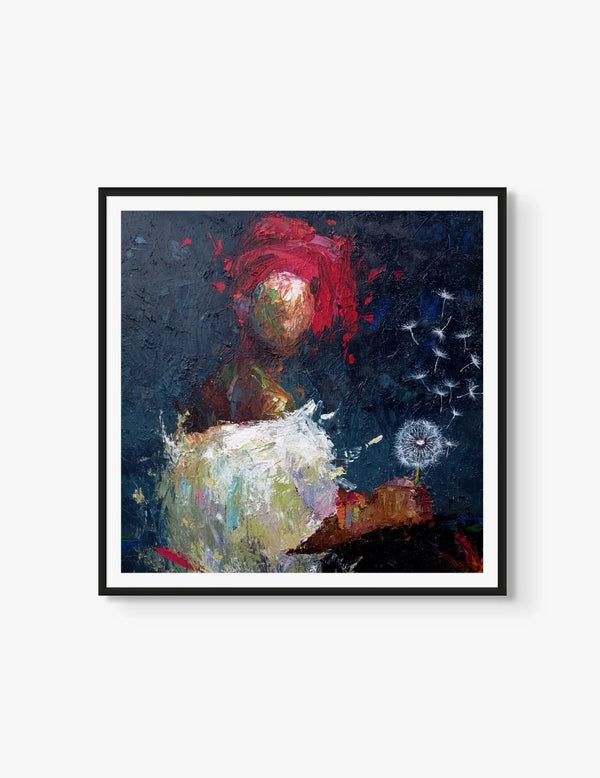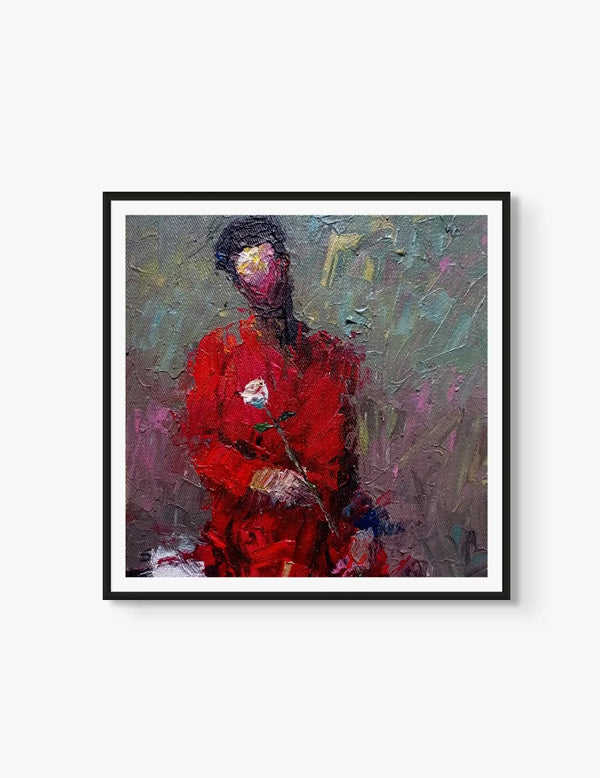In Conversation with Babatunde Kesa

“My message is simple: vulnerability is strength, and it’s through sharing our struggles that we can find hope and connection.” - Babatunde Kesa
Art has long served as a mirror to society, reflecting its triumphs, struggles and silent battles. For Nigerian artist Babatunde Kesa, art is more than just a medium of expression; it is a powerful tool to break the silence surrounding men’s mental health. Through his evocative pieces, Kesa challenges societal norms, opens up critical conversations, and offers a safe space for vulnerability and healing. As an emerging voice in African abstract expressionism, Kesa is helping to shine a light on the emotional realities often left out of mainstream narratives, especially those affecting men.
Breaking the Silence: The Message Behind the Art
Kesa’s art carries a profound message: life, in all its fullness, should be accessible to everyone. This accessibility to a fullness of life essentially denotes accessibility to human connection, shared emotional vulnerability and open dialogue. “Whether we are men or women, it is crucial to have people close to us that listen to us without judgment, and that we can share our plights with,” Kesa explains. Kesa's work is a call to action, urging men, especially African men, to speak up about mental health and seek support. It also encourages the wider community, including women, to nurture empathy and understanding towards men and their mental health challenges.
This mission is especially important to Kesa: “Men’s mental health issues are frequently ignored or dismissed. Based on my environment (I can only speak based on my environment), I’ve observed that men are often seen as inherently stronger and are expected to endure silently. But we too are just human,” he reflects. Through his work, Kesa seeks to dismantle harmful stereotypes and shine a light on the often-overlooked emotional challenges men face.
The Societal Weight of Masculinity

For Kesa, societal expectations play a significant role in the silence surrounding men’s mental health. “Men often struggle to talk about their mental health because society expects a lot from them. It looks at us as these masculine beings, with strength, and un-emotional stoicism,” he explains. In Nigeria, where Kesa was born and raised, boys are met with phrases such as “Boys don’t cry” or “Are you not a man?” from a young age. Even when unintentional, the cultural narrative surrounding Nigerian boys as they grow up normalises suppressing emotions and silently enduring pain. Kesa explains, “These statements perpetuate the idea that expressing emotions is a sign of weakness”.
This narrative is further reinforced within families as boys are often raised to shoulder responsibility without complaint, while girls receive more empathy and care. This imbalance neglects men’s emotional needs, fostering the perception that vulnerability equates to weakness. As a result, many men internalise their pain, discouraged from seeking help due to fear of judgment or misunderstanding. Even when they do open up, they are often met with labels of weakness, perpetuating a vicious cycle of silence and isolation. This pattern is echoed in findings by the National Institute of Mental Health, which notes men are far less likely to seek help for emotional challenges.
Additionally, mental health struggles are often seen as a sign of spiritual weakness. Kesa believes this cultural perspective needs to change because, as he puts it, “Men too have emotions and need empathy and support” – a shift that could profoundly benefit individual men and society alike.
Art as Therapy: Healing Through African Abstract Expressionism

Artworks by Babatunde Kesa
For Kesa, art is not just a profession; it is a lifeline. “Art has helped me express emotions that are difficult to articulate,” he shares. Whether through painting in the style of African abstract expressionism or sculpting, his creative process provides a therapeutic outlet, allowing him to confront his struggles and connect with others with similar experiences.
This connection is central to Kesa’s vision. He hopes to make these issues more relatable and less taboo by using African abstract expressionism as a lens for exploring mental health. “The more mental health is represented in art, the more normalized it becomes to talk about it,” he emphasizes. His pieces are not just works of art but also invitations for dialogue, reminding viewers that vulnerability is a strength, not a weakness.
Building Mental Health Support Systems for Men
Kesa explains that the very thing men need most when struggling with their mental health is a support system. Limited awareness and access to adequate mental health support systems persist, particularly within Nigeria, an issue echoed even in the UK, where Black and minority ethnic men face disparities in how they access and experience mental health care. This is where having a community or trusted friend to confide in can play a big role, as Kesa explains, "I am an introvert, so opening up to others has not always been easy. Since getting married, it has been my wife who has been a support system for me, encouraging me and offering understanding.” Kesa notes. He emphasises again, “Creating art has been a consistent form of self-expression and healing. It provided me with an outlet. Art is my support system: When I am at a loss for words, I create art. I just have to create.” Kesa advises others to do the same, that is, finding solace through art, whatever medium this may be: “Don’t underestimate the healing power of creativity.”
Kesa also sees potential within the art community to further open up conversations about mental health. While exhibitions and platforms focused on these topics are becoming more common, he believes there is still significant room for progress. He highlights a friend’s recent solo exhibition in Nigeria centred on men’s mental health, which successfully sparked important discussions. Kesa emphasises the need to amplify such initiatives to foster more open and supportive dialogues in the community.
Looking ahead, Kesa's "wish" is for a society where men feel safe to express their emotions without fear of judgment. Unfortunately, we’re not quite there yet. "Men often keep their thoughts to themselves, because if they try to express themselves, people start judging them. It’s therefore important to create awareness, good support systems and conversations about men’s mental health.” Kesa strongly advocates for grassroots change, starting with integrating mental health education into school curricula. He believes that addressing these issues from a young age allows boys to grow into men who feel supported and understood. As he explains, “Boys will and need to become men one day – and for that to happen, there needs to be space for this conversation. They need to feel welcomed and accommodated by society in this regard.”
Kesa sees art as a powerful tool for change, “Art has a unique ability to spark dialogue,” he says. Through his work, he aims to inspire others to share their struggles and seek help. His message to men who may be suffering silently is simple yet profound: “My heart goes out to you, men. Your emotions are valid, and opening up is not only okay – it is necessary for healing.”
Babatunde Kesa: Vulnerability as a Creative Force
Babatunde Kesa’s journey as an artist is a powerful testament to the transformative power of creativity. He hopes to inspire healing, dialogue and connection through his deeply personal and evocative works. His message is a call to action, urging society to create a safe space for men to speak, feel, and seek support without fear. As Kesa aptly reminds us: “My message is simple: vulnerability is strength, and it’s through sharing our struggles that we can find hope and connection.”
Explore Babatunde Kesa’s artwork and find out more about the meaning behind the art. Whether to elevate your personal space or to gift, these artworks offer a meaningful way to support the conversation around men’s mental health while owning a piece of African abstract art that speaks to the heart.



